This amazing little fuzz butt, for anyone who doesn’t already know, is Kitsune. Kit for short. Kit is an oversized papillon who turned 14 years old last December. Shh, we won’t tell Kit that he’s a senior dog. He doesn’t seem to realize it. Some of his hobbies include annoying his younger brother Fenrir, eating all the things, exploring in the woods, nose work, and snuggling. Throughout his life, I’ve used supplements to help keep Kit healthy. I’ve always made a point to do lots of research, and supplement my dogs based on their current, individual needs. This post is about the supplements I’m currently using for my senior dog, Kitsune.

Post Contents:
The 411 On Kit’s Current Health: IVDD
Kit is doing pretty well now, but had a bit of a rough time, health-wise, recently. Kitsune was diagnosed with cervical IVDD last September. After his original IVDD diagnosis, his health kind of spiraled a bit. He didn’t react well to taking Prednisone to treat the IVDD. Kit started displaying Cushing’s Disease type symptoms, especially polydipsia (excessive thirst/drinking) and polyuria (frequent urination). He had a bit of hind limb weakness. We don’t know if it was caused by the IVDD or his medication/Cushing’s. Bloodwork we had done was pretty good, but he did have elevated liver enzymes.
Cushing’s Disease?
During his IVDD recovery, Kit was diagnosed with idiopathic Cushing’s Disease. That is basically Cushing’s Disease that is caused by a medication. Normally, idiopathic Cushing’s Disease takes between 6 and 12 weeks to resolve after dogs are taken off the medication that caused it. Kit was completely weaned off of Prednisone by October 26th. So, as of the time I’m posting this, it’s been just over 12 weeks. Kit’s Cushing’s symptoms have greatly decreased but are not 100% resolved. We’re unsure currently whether he is just taking a tad bit longer to recover than normal, or if he could potentially have the beginnings of actual Cushing’s Disease that was made worse by the medication he was on.

A Heart Murmur
Kitsune also has a very mild heart murmur. Right now, it’s just something we’ve been keeping an eye on. So far, it hasn’t changed or gotten worse at all, and it doesn’t impact his life. It’s not bad enough that he requires any medication at this time. However, I am mentioning it here because it does slightly impact Kit’s supplement regime.
AND Arthritis?
Shortly after his IVDD recovery, Kit was also diagnosed with arthritis. We started to notice that he would look stiff and sore after laying down for a while. At first, we were worried that it was another flair-up of the IVDD, so soon after his first. But after a workup at the vet, they said that it was actually arthritis. We think we noticed it bothering him so much more directly after his IVDD diagnosis for two reasons. One, because he had been on strict rest during his IVDD recovery. The lack of exercise probably made his arthritis feel worse. And secondly, because I had been supplementing him with Turmeric, a natural anti-inflammatory, before his IVDD diagnosis. I had to temporarily stop giving him Turmeric because it conflicted with one of his IVDD medications.
Helping Kit’s Health Issues with Supplements?
Unfortunately, it’s usually pretty inevitable that, as dogs age, they encounter more health issues. I had hoped, of course, that this wasn’t going to hold true with my own dogs. But it has. I’ve always been the type to really research my options, and put a lot of thought into things before starting my dogs on medications. It’s why, for example, I was hesitant to start Kit on Rimadyl (carprofen) for his arthritis when his vet suggested it. I didn’t want Kit to be in pain, of course. But Rimadyl can come with some serious side effects such as kidney and liver damage, especially when given long term. Kit, currently, already has an impaired liver, so starting him on a med that could cause more liver damage seemed risky.
If my only options had been trying the Rimadyl or making Kit deal with daily arthritis pain, of course I would have went with the meds. But, thankfully, I knew there were some other options on the table. Prescription pain meds will still be an option in the future, if Kit does ever need them. But I decided to try supplements first. Can supplements replace prescription medication? Sometimes. It really depends on your individual dog, and what conditions you are trying to treat. Below, I’ll share the supplements that have been working for my senior dog for some of his various health conditions.
Kit’s Supplements:
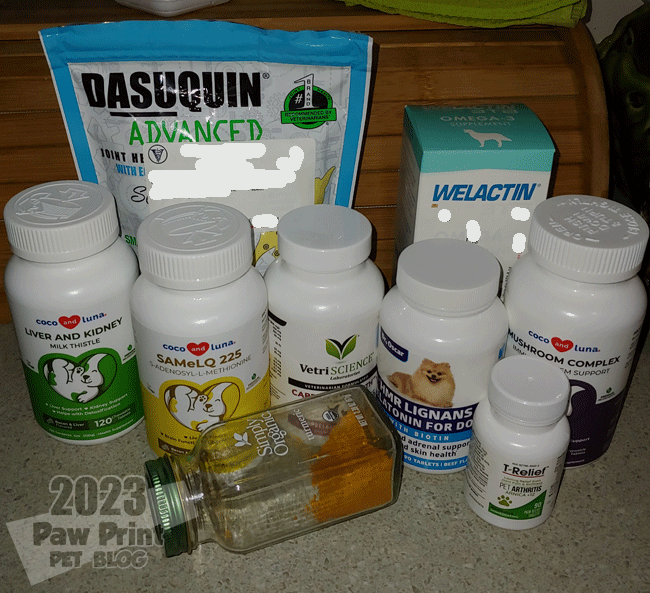
Coco and Luna Milk Thistle: Milk thistle can help support the liver, kidneys, heart, skin and coat. I started giving it to Kit after he had bloodwork done a few months ago that showed elevated liver enzymes. I will update this post after his next blood work up.
Coco and Luna SAMeLQ: SAMe is a supplement that has been shown to improve liver, brain, joint, and cognitive health. Like the milk thistle, I started Kit on SAMe to hopefully help support his liver. However, SAMe is a supplement often recommended for senior dogs because of it’s agility to help preserve joint and cognitive function.
Dasuquin Advanced: This supplement we get from Kit’s vet. It’s your basic Glucosamine/Chondroitin/MSM joint supplement. The Advanced version of Dasuquin, available from vets, contains additional ingredients to support joint health.
Welactin: Welactin is, basically, a fish oil supplement. We were using another brand of fish oil before. Kit’s vet recommended this one so we decided to give it a try. Kit hasn’t been on it very long. I’ll have to update at a later date about whether or not I feel like it helps Kit.
VetriScience Cardio Strength: I’ve used this supplement for general heart health since we originally learned about Kit’s heart murmur. I guess I can’t say for sure whether this supplement is helping Kit or not but, I will say, that his murmur is very mild and, thankfully, so far has not gotten any worse over time.
Lignans & Melatonin: Lignans and melatonin are commonly used to treat the symptoms of Cushing’s Disease. They do not decrease a dog’s cortisol levels, but they can help manage symptoms.
Yes Still Going, More Supplements…
Coco and Luna Mushroom Complex: Unlike Kit’s other supplements, I give him mushroom supplements for general health. I’ll have to write a post about the benefits of supplementing dogs with mushrooms sometime! Lately I’ve been using this Coco and Luna supplement, however I’m not super brand loyal and have used other mushroom supplements in the past.
T-Relief Arthritis: T-Relief is a holistic pain relief pill. I think it’s either this, or the next supplement, or else a combo of the two, that has eliminated Kit’s arthritis pain!
Turmeric: I supplement Kit with turmeric by making him home made turmeric/golden paste treats. You can read more about the benefits of turmeric for dogs here, and see the recipe for the treats I use for Kitsune here. Turmeric had greatly improved what used to be Kit’s frequent GI issues, and I believe helped a great deal with his arthritis as well. Turmeric is a supplement I’ll probably always give Kit, as long as it doesn’t conflict with any other medication he may need.
ProDen PlaqueOff: I debated whether or not to consider this a supplement. These are the dental chews that I use for both of my dogs.

Myos Canine Muscle Formula: Myos is a highly recommended, although not cheap, supplement for dogs experiencing muscle loss/wasting for any reason. In clinical studies, it has also been shown to help with arthritis. I started supplementing Kit with Myos after we noticed some muscle loss during his recovery from IVDD. Because he is 14 now, and muscle loss can also be common in older dogs, I’m planning on keeping Kit on Myos to support his continued health and mobility.
That’s a Lot of Supplements!
It doesn’t feel like that much when I’m giving Kit his supplements day to day. We’ve fallen into a routine, so giving him all his supplements never feels like a big deal. Some he gets in the morning with breakfast. A few he gets in the middle of the day, some he gets with dinner, and the melatonin/lignans he gets right before bed. He gets turmeric and T-Relief twice a day, but everything else just once a day.
I know some of you are probably thinking – all those supplements must be expensive. Probably. I’ve never sat down and added up the costs. The way I look at it, it would be even more expensive if he was on prescription meds from the vet. Then, on top of the medications, he’d need bloodwork done every 3 months to make sure the meds weren’t damaging his organs. His supplements aren’t as risky, and, so far, have been effective in helping to deal with his various issues. I know for sure that our supplement routine helps his arthritis.
Keeping this Post Updated
I’ll keep this post updated because, like I mentioned above, I very much base my dogs’ supplements on what they need at any given time. Some supplements I give for a while then stop, others I will likely give Kit for the rest of his life. I’m thinking of writing a more in depth post about each supplement I use, what it does, why I give it, and how I feel it’s helped my dogs. Let me know if anyone would find something like that helpful. This post is already getting long, so I didn’t want to include even more info here.
Always remember to talk to your vet before starting a new supplement. Although many dog supplements are available over the counter, some of them can interact with either other supplements or with prescription medications. Especially if your dog is a senior with multiple health concerns, and you are using multiple supplements, you want to take extra care to ensure that everything you are giving your dog is safe both on its on, and in combination with everything else your dog is getting.
Comment below! What supplements, if any, do you give to your dog? Have you noticed significant differences in their health since you started?
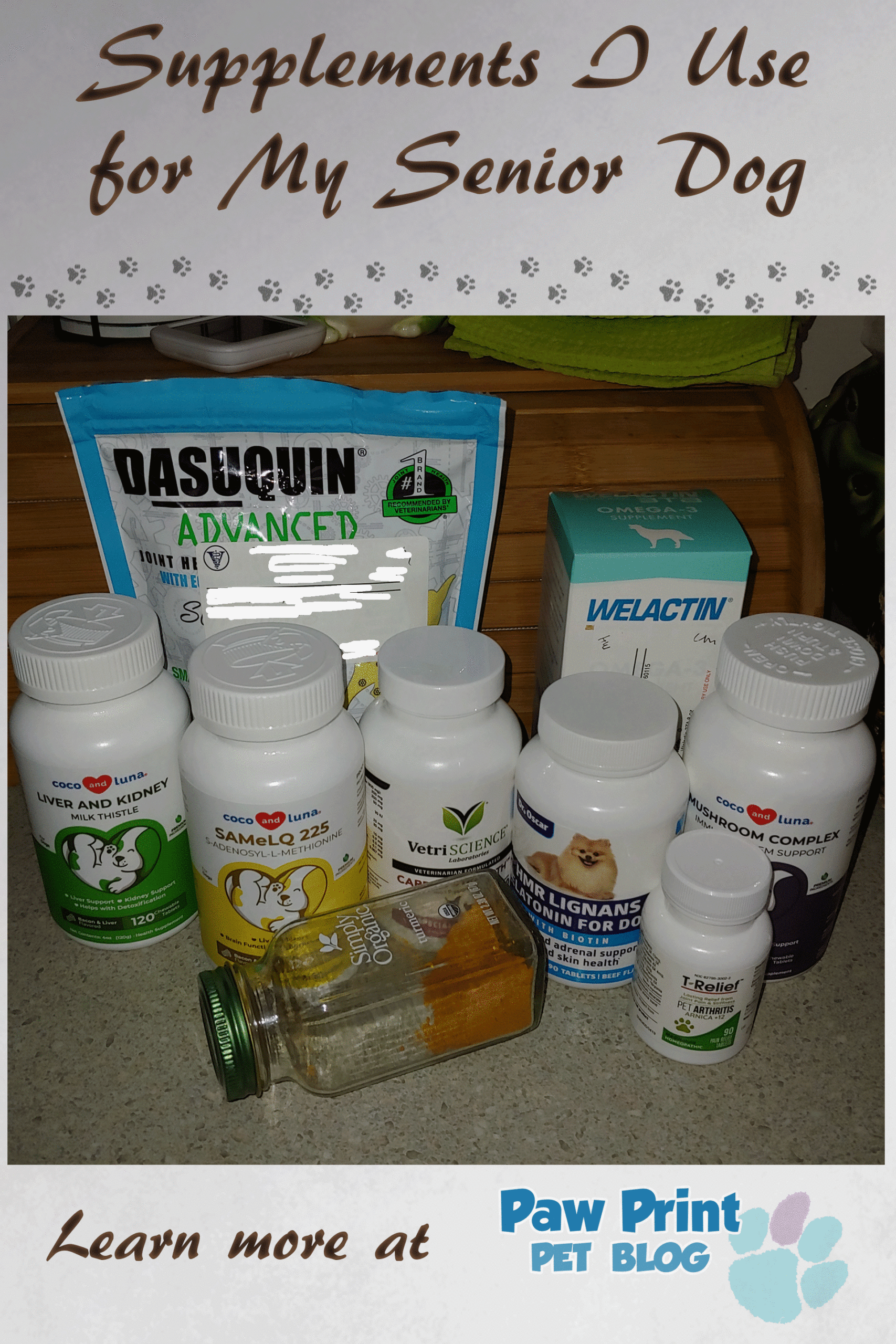
We’ve, unfortunately, been dealing with content scrapers stealing our articles lately. You shouldn’t be seeing this article on any site other than pawprintpetblog.com! If you’re reading this article on any other site, we’d love for you to take the time to contact us and let us know and, if you have the time, stop by and visit us on our official site! Thanks you.

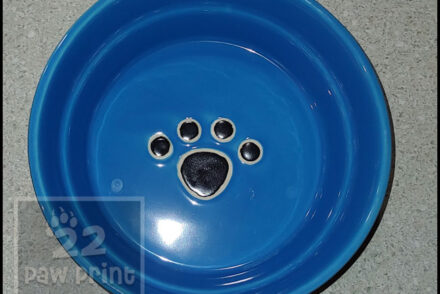
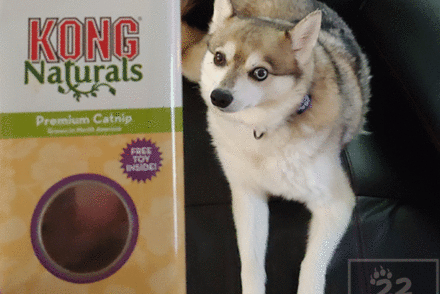
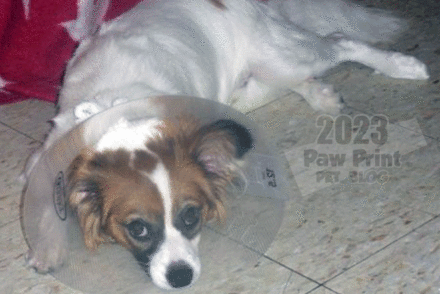

No Comments